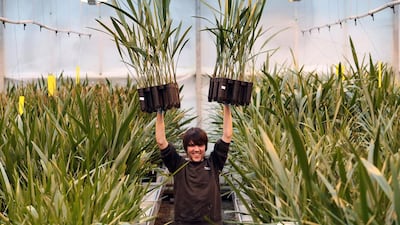SOMERSET, UNITED KINGDOM // The countryside in south-west England offers a stark contrast to the UAE’s wide open deserts: it is all lush fields, rustic stone houses and narrow winding lanes.
Surprising though it may seem, however, this part of the United Kingdom has produced thousands of the date palms that adorn the Emirates.
From the Somerset village of Baltonsborough, Date Palm Developments (DPD) has propagated and sent to the UAE nearly one million young cloned date palms over the past two decades.
Date palms are cloned because, when grown from seed, genetic variability produces trees that are not uniform and are less reliable in terms of yield. But cloning date palms is a specialised and expensive discipline and few companies around the world produce large numbers.
So, wherever they are based, companies with long experience of the required techniques can find their plants are sought after across the world, including in the Arabian Gulf. About 40 per cent of DPD’s output is sent to the Emirates, with the rest spread across more than a dozen other nations.
“There are limitations on the scale. You cannot produce hundreds of thousands and produce them well. It’s a difficult crop to do technically. There’s a large demand, it’s a wide market,” said Dr Avril Brackpool, DPD’s managing director.
“There’s 30 years of propagation history of date palms here, starting as research and development, with the process being optimised over the years.”
It may be too cold in Britain for date palms to actually flower and produce fruit, yet DPD’s greenhouse contains tens of thousands of young date palms. They range in height from a few inches to many feet.
The process of creating them starts when date palm offshoots – these are like side branches – arrive in Britain from countries such as the UAE, Saudi Arabia and Jordan.
Tiny sections of the growing area of these offshoots are cut out and planted in a nutrient medium in a small container in the dark.
These tissues generate new shoots, and every few weeks these are separated out by laboratory staff working in sterile conditions, and transferred to a new culture vessel.
Each of these culture lines is DNA “fingerprinted” and its origin recorded, so the company can be certain which variety of date palms it will produce.
After about six months in the growth room, plants are planted into “torpedo” plant pots and placed in the greenhouse’s controlled high-humidity area, where compressed air and water are sprayed to create a fine fog.
“[Until this stage] they’ve been growing in closed containers. It’s a very cosy environment, very humid. If we put the plants straight in the greenhouse the leaves wouldn’t be able to retain water and would dry out,” said greenhouse manager Jane Chalk.
Two months later, with their water-holding ability developed, the plants are taken out and grown in the greenhouse for a year to 18 months. The greenhouse can hold 250,000 plants and has overhead lamps for additional daylight, and sprinklers used at night.
Once ready to be sent off, UAE-destined plants are packed 50 each in specially made boxes and flown to Dubai, from where they are transferred to Fujairah’s Green Coast Nurseries, DPD’s partner in the Emirates.
“[If they are going] to Dubai, we would get them collected from us on a Thursday afternoon, and the plants would be in Dubai by Sunday,” said Matthew Pickford, from DPD’s marketing and sales department.
At Fujairah, the plants are transplanted into large compost bags and grown under shade for six to nine months before being sent to customers.
About two to three years later they should be producing succulent dates, something they can do for more than three decades. Some trees are planted, largely for ornamental purposes, in gardens and central reservations.
“It’s satisfying to see the trees in the field and eat the fruit from trees that come from here. The staff like it when fruit from DPD trees is brought back from the Emirates for everyone to enjoy,” said Mr Pickford.
newsdesk@thenational.ae


